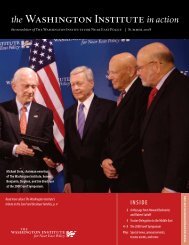Michael Eisenstadt David Pollock How the United States Benefits ...
Michael Eisenstadt David Pollock How the United States Benefits ...
Michael Eisenstadt David Pollock How the United States Benefits ...
Create successful ePaper yourself
Turn your PDF publications into a flip-book with our unique Google optimized e-Paper software.
every aspect of modern life on computers creates<br />
vulnerabilities for cybercrime, cyberterror, cyberespionage,<br />
and cyberwarfare—to include attacks<br />
on civilian critical infrastructure and military computer<br />
networks. As a result, <strong>the</strong> revolution in cyber<br />
affairs has <strong>the</strong> potential to change <strong>the</strong> way states<br />
think about deterrence and national security. Moreover,<br />
because offensive cyber capabilities are much<br />
more developed than cyber defenses, even sophisticated<br />
individuals and nonstate actors can potentially<br />
cause significant damage. 27 To deal with <strong>the</strong>se<br />
unprecedented challenges, <strong>the</strong> U.S. National Cyber<br />
Strategy has stressed <strong>the</strong> need to partner with foreign<br />
countries to secure cyberspace against criminals<br />
and hostile states. 28<br />
Israel’s capabilities in all areas of cyber<br />
technology—in both <strong>the</strong> civilian and military<br />
domains—are substantial, as are its partnerships<br />
with leading U.S. companies and governmental<br />
institutions in this field. Israeli experts play a<br />
disproportionate role in many practical computerrelated<br />
and telecommunications inventions and<br />
applications, in hardware and software alike. Instant<br />
messaging, voicemail menus, Voice-over Internet<br />
Protocol (VoIP), online money transfers, and<br />
data-mining programs are a few of <strong>the</strong> widespread<br />
innovations to which Israel has contributed a major<br />
share. The leading U.S. firms with interests in this<br />
area, such as Microsoft, Google, Apple, Cisco,<br />
Hewlett-Packard, Texas Instruments, and Intel,<br />
have all established R&D centers in Israel, where<br />
key employees are often veterans of elite military<br />
computer units. 29<br />
As Microsoft founder Bill Gates noted not<br />
long before his first visit to Israel in mid-2006,<br />
<strong>the</strong> “innovation going on in Israel is critical to<br />
<strong>the</strong> future of <strong>the</strong> technology business.” 30 More<br />
recently, in April 2012, a top Intel executive noted<br />
that many, if not most, of <strong>the</strong> firm’s major technical<br />
innovations over <strong>the</strong> past thirty years had started<br />
off in Israel—including <strong>the</strong> latest generation of<br />
processors (“Ivy Bridge” and “Sandy Bridge”)—<br />
and that Ivy Bridge accounted for 40 percent of<br />
Intel’s global revenue in 2011. He claimed fur<strong>the</strong>r<br />
<strong>How</strong> <strong>the</strong> <strong>United</strong> <strong>States</strong> <strong>Benefits</strong> from Its Alliance with Israel<br />
that Intel has never had an intellectual property<br />
rights, piracy, or patent problem in Israel, and that<br />
<strong>the</strong> Intel factory in Kiryat Gat, Israel, is <strong>the</strong> first<br />
to produce microchip wafers with a zero defect<br />
rate. 31 Likewise, a number of Google applications<br />
were ei<strong>the</strong>r started or designed in Israel, including<br />
Google Suggest, Google Insights for Search,<br />
In-Page Analytics, Live Results, Person Finder,<br />
Interactive YouTube Videos, Gmail Priority<br />
Inbox, Hot Topics, Hot Searches, and “Got <strong>the</strong><br />
wrong Bob?”<br />
In <strong>the</strong> domain of cyber applications for national<br />
security, Israel clearly has much to contribute to <strong>the</strong><br />
<strong>United</strong> <strong>States</strong> (and o<strong>the</strong>r allies). 32 Israel’s overall<br />
capabilities in this area—in both <strong>the</strong> civilian and<br />
military domains—are significant. A recent report<br />
by a Brussels-based security and defense think tank,<br />
based on a survey of 250 experts worldwide, placed<br />
Israel (along with only Finland and Sweden) in <strong>the</strong><br />
first tier of nations in terms of readiness to deal<br />
with cybersecurity threats. 33 Likewise, <strong>the</strong> Israeli<br />
military is believed to be perhaps <strong>the</strong> first to have<br />
integrated cyber into tactical combat operations,<br />
in Lebanon in 2006 and in Gaza in December<br />
2008–January 2009. 34 And as part of its September<br />
2007 strike on <strong>the</strong> Syrian nuclear reactor at<br />
al-Kibar, Israel is rumored to have taken down<br />
Syrian air defenses by means of electronic attack<br />
and network penetration. 35 In August 2011, Israel<br />
formally established a National Cyber Directorate<br />
to coordinate civilian and military activities in this<br />
area, better coordinate government activities with<br />
<strong>the</strong> private sector, and promote partnerships among<br />
academia, government, and industry—though its<br />
establishment has reportedly been accompanied by<br />
teething problems. 36<br />
It remains to be seen how effective this new<br />
National Cyber Directorate will be. Israel may be<br />
<strong>the</strong> most heavily targeted country in <strong>the</strong> world, by<br />
hostile hackers, nonstate actors, and states, with<br />
as many as a thousand web attacks per minute—<br />
though most of <strong>the</strong>se are simple denial-of-service<br />
attacks. 37 While Israel’s critical infrastructure is<br />
considered among <strong>the</strong> best protected in <strong>the</strong> world<br />
The WashingTon insTiTuTe for near easT Policy 35













